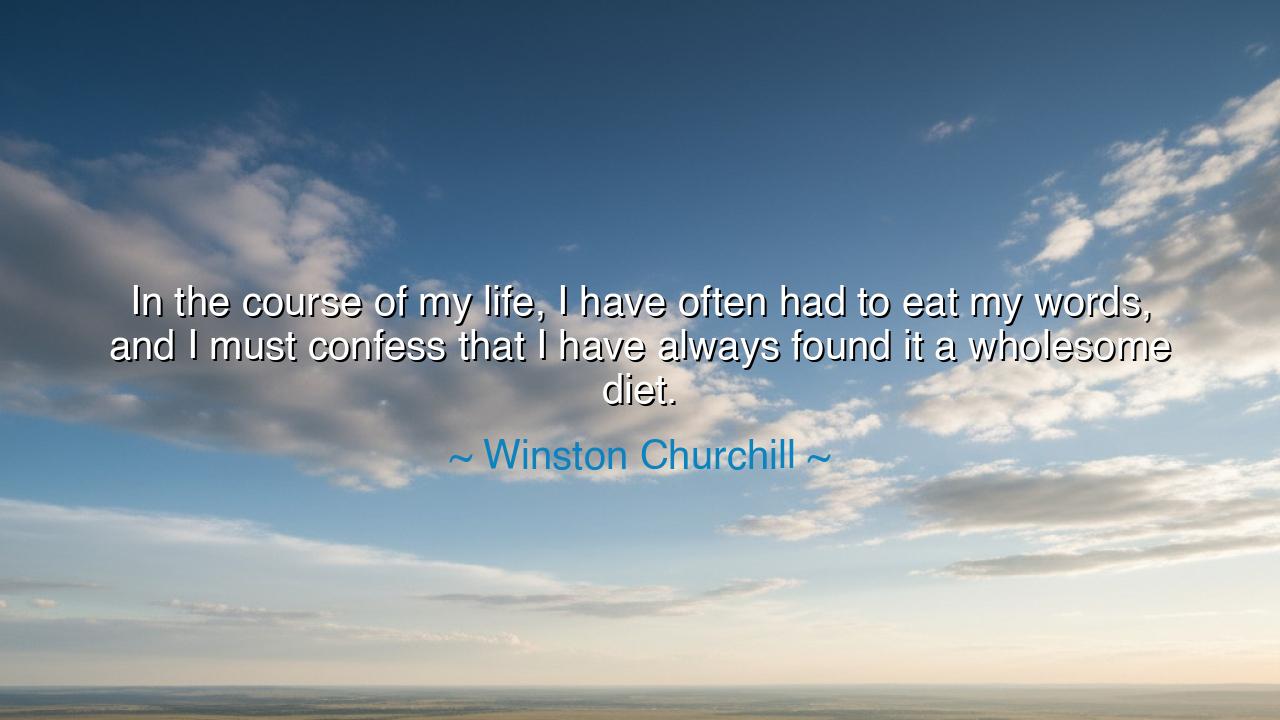
In the course of my life, I have often had to eat my words, and I
In the course of my life, I have often had to eat my words, and I must confess that I have always found it a wholesome diet.






When Winston Churchill said, “In the course of my life, I have often had to eat my words, and I must confess that I have always found it a wholesome diet,” he spoke with the humility and humor of a man who had seen the full breadth of triumph and failure. Beneath the wit lies a truth as ancient as human wisdom itself — that pride is poison, but humility is nourishment. To “eat one’s words” is to admit error, to face the bitter taste of one’s own misjudgment. Yet Churchill, with the wisdom of age and battle, declares this act not bitter, but wholesome, for he understood that only those who can swallow their pride are strong enough to grow.
Churchill’s quote rises from a life forged in the fire of history. As a statesman, soldier, and writer, he spoke boldly and often, and not every word of his was infallible. He had known defeat — in politics, in command, in judgment — yet each failure became a meal that fed his wisdom. When he says he found this diet “wholesome,” he is teaching that correction is nourishment for the soul. The man who never admits his mistakes starves on the emptiness of ego, while the man who learns from them grows stronger with every humbling lesson. In this way, Churchill’s humility becomes not weakness, but a mark of greatness — for only those secure in their strength can laugh at their own folly.
This wisdom is as old as the philosophers. Socrates, who called himself the wisest man in Athens, did so not because he knew everything, but because he knew that he knew nothing. To recognize error, to yield to truth, to change one’s stance when proven wrong — these are the pillars of true wisdom. Churchill’s words echo this ancient humility, reminding us that knowledge is not a possession but a pursuit, and that the path of the wise is paved with the remnants of pride once swallowed. Just as the body is strengthened by wholesome food, so the character is strengthened by the diet of reflection and repentance.
History itself offers us the clearest example of Churchill’s own meaning. In the years before the Second World War, he was scorned and dismissed for warning Britain of the rising threat of Nazi Germany. His words were ignored; his political career, thought to be finished. Yet when the storm came, and the truth of his warnings was revealed, it was Churchill who rose to lead his nation through darkness. But rather than gloat over his vindication, he remained humble in victory, aware that he too had once erred in earlier years. He knew that leadership requires not the arrogance of certainty, but the courage to acknowledge, adjust, and advance. Thus, his “wholesome diet” of eating his words had tempered him into a man capable of guiding others through humility rather than pride.
There is a paradox in his phrase — that what tastes unpleasant to the ego is often medicine for the soul. To admit fault is to strip oneself bare, to abandon the armor of pride. Yet it is precisely through this act that one becomes free. The ancients said that the tree that bends in the storm survives, while the rigid one breaks. So too is it with the spirit: the proud man resists correction and shatters under the weight of his own arrogance, while the humble man bends, learns, and rises renewed. Churchill’s laughter at his own words, therefore, is not self-deprecation, but the joy of freedom — freedom from the tyranny of ego.
Even the great Roman Emperor Marcus Aurelius, in his Meditations, wrote that when one is corrected by reason, he should “gladly change,” for to cling to error is to live against nature. Churchill, though a man of war, embodied this Stoic wisdom. He knew that no victory — political, personal, or moral — can endure if it is built on pride. By turning self-correction into a source of strength, he transformed his mistakes into nourishment, his regrets into resilience, and his humility into humor.
And so, the lesson to the generations that follow is clear: never fear the taste of your own words. Speak with conviction, but hold your beliefs lightly enough to let truth reshape them. Do not see apology as defeat, but as refinement. Each time you acknowledge error, you feed the higher self — the part of you that seeks growth over glory. Be willing to eat your words, and let that diet make you strong, wise, and gracious.
For as Churchill reminds us, the ego hungers for praise, but the soul hungers for truth. And truth, though it may humble, always heals. So when the day comes that your words turn against you, do not despair — sit at the table of humility, eat well, and rise renewed. For those who can consume their pride with grace will never go hungry for wisdom again.






AAdministratorAdministrator
Welcome, honored guests. Please leave a comment, we will respond soon